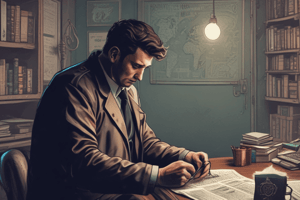Podcast
Questions and Answers
What percentage of criminal investigation is attributed to perspiration, according to Hans Gross?
What percentage of criminal investigation is attributed to perspiration, according to Hans Gross?
- 98%
- 90%
- 95% (correct)
- 80%
What is the primary goal of verifying a criminal complaint during an investigation?
What is the primary goal of verifying a criminal complaint during an investigation?
- To verify if the criminal complaint is bona fide (correct)
- To recover weapons used
- To arrest the perpetrator
- To determine if a crime has been committed
What type of investigation is initiated based on reports and complaints filed to a law enforcement agency?
What type of investigation is initiated based on reports and complaints filed to a law enforcement agency?
- Non-criminal investigation
- Covert investigation
- Re-active investigation (correct)
- Pro-active investigation
Which of the following is NOT a category of criminal investigation?
Which of the following is NOT a category of criminal investigation?
What is the ultimate goal of a criminal investigation, as stated in the content?
What is the ultimate goal of a criminal investigation, as stated in the content?
What type of investigation is conducted to catch the criminal in the act of committing a crime?
What type of investigation is conducted to catch the criminal in the act of committing a crime?
What refers to the beliefs regarding the evidence, patterns, leads, tips and other information developed and uncovered in the case?
What refers to the beliefs regarding the evidence, patterns, leads, tips and other information developed and uncovered in the case?
What type of investigation is an official inquiry conducted by the government agency to uncover facts and determine the truth?
What type of investigation is an official inquiry conducted by the government agency to uncover facts and determine the truth?
What type of investigation is conducted to identify the original sources of data or causes of problems?
What type of investigation is conducted to identify the original sources of data or causes of problems?
What type of investigation is pursued by the members of the press?
What type of investigation is pursued by the members of the press?
Flashcards are hidden until you start studying
Study Notes
Criminal Investigation as an Art
- Criminal investigation is considered an art because it doesn't follow rigid rules or principles and is often governed by intuition, felicity (inspiration), and chance (or luck to a minor extent)
- Hans Gross states that criminal investigation is 95% perspiration, 3% inspiration, and 2% luck, emphasizing the importance of effort in investigations
Criminal Investigation as a Process
- Criminal investigation is a patient, step-by-step, and meticulous examination of something or somebody related to a criminal incident
- It involves a systematic approach to gather information and evidence
Goals of Criminal Investigation
- Determine if a crime has been committed
- Verify the legitimacy of a criminal complaint
- Gather legally obtained information and evidence to identify criminal offenders
- Arrest the perpetrator
- Reconstruct the crime scene
- Obtain admission or confession through interviews and interrogations
- Recover weapons, stolen properties, and proceeds of the crime
- Establish the motive and criminal intent of the offender
- Determine and analyze the modus operandi
- Determine the gravity of the offense
- Recommend or refer the best possible case to the prosecutor
Categories of Criminal Investigation
- Criminal Investigation: inquiry conducted by law enforcement agencies to investigate the commission of a crime
- Non-Criminal Investigation: inquiry conducted on non-criminal incidents or events
- Reactive Investigation (Overt Investigation): initiated based on reports and complaints filed to a law enforcement agency
- Proactive Investigation (Covert Investigation): conducted before and during the commission of the offense to catch the criminal in the act
Components of Criminal Investigation
- Pattern: series of similarities that link a case or indicate that the same person is committing a series of crimes
- Leads: clues or pieces of information that aid in the progress of an investigation
- Tips: leads provided by citizens that aid in the progress of an investigation
- Theories: beliefs regarding evidence, patterns, leads, tips, and other information developed and uncovered in the case
Forms of Investigation
- Formal Investigation: official inquiry conducted by a government agency to uncover facts and determine the truth
- Inquest: effort to search for the basic cause of an incident, such as the commission of a crime
- Inquisition: historical description of a penetrating investigation concerning a religious issue
- Probe: extensive search inquiry conducted by a government agency
- Research: careful and patient investigation done by scientists or scholars to identify original sources of data or causes of problems
- Investigative Reporting: a recent type of investigation pursued by members of the press
Studying That Suits You
Use AI to generate personalized quizzes and flashcards to suit your learning preferences.




